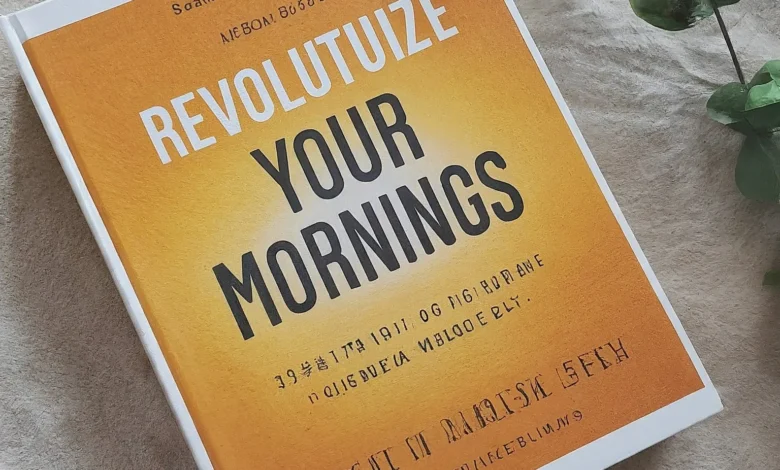Revolutionize Your Mornings: Strategies for Early Risers

Are you tired of rushing every morning? Picture starting your day calm and energized. That’s the power of a solid morning routine for early risers. Let’s explore how to become an early bird and make the most of your mornings.
Did you know? Many successful people wake up early. Apple CEO Tim Cook and former First Lady Michelle Obama are known early risers. But don’t worry – you don’t need to be famous to benefit from this habit. We’ll show you how to create a morning routine that works for you.
The Science of Early Rising
Let’s look at why waking up early can be so helpful:
Your Body’s Natural Rhythm
Your body has an internal clock called the circadian rhythm. This 24-hour cycle tells you when to:
- Sleep
- Wake up
- Eat
When you match your schedule to this rhythm, you’ll likely feel more energized and focused all day.
Sleep Cycles: Quality Matters
While you sleep, your body goes through 90-minute cycles of light and deep sleep. Waking up at the end of a cycle can help you feel more refreshed. That’s why sometimes you might feel groggy even after sleeping for a long time.
Benefits of Early Rising
Waking up early can bring many positive changes to your life:
- Increased Productivity: A quiet morning gives you time to focus without distractions.
- Better Mental Health: Early risers often report feeling more positive and less stressed.
- Improved Physical Health: You’ll have time for exercise and a healthy breakfast.
- More “Me Time”: Enjoy peaceful moments before the day’s demands begin.
- Better Sleep Quality: Early risers often find it easier to fall asleep at night.
By starting your day early, you set yourself up for success. You’ll have time to plan, reflect, and take care of yourself before diving into your daily tasks.
Preparing for Success: Evening Routines
Your morning success starts the night before. A good evening routine can make waking up early much easier. Let’s explore some effective strategies:
Create a Relaxing Bedtime Ritual
To help your body wind down, try these evening activities:
- Read a book for 30 minutes
- Take a warm bath or shower
- Practice gentle yoga or stretching
- Write in a journal to clear your mind
- Listen to calming music or nature sounds
Choose activities that help you relax and stick to them nightly.
Optimize Your Sleep Environment
Your bedroom plays a big role in your sleep quality. Here’s how to make it sleep-friendly:
- Keep it dark: Use blackout curtains or an eye mask.
- Stay cool: Set your thermostat between 60-67°F (15-19°C).
- Reduce noise: Use earplugs or a white noise machine if needed.
- Invest in comfort: Get a good mattress and pillows.
- Limit electronics: Keep screens out of the bedroom.
Strategies for Becoming an Early Riser
Now, let’s look at different ways to shift your wake-up time:
Gradual Adjustment Technique
This gentle approach works well for many people:
- Set your alarm 15 minutes earlier than usual.
- Stick to this time for a week.
- Each week, set your alarm another 15 minutes earlier.
- Continue until you reach your desired wake-up time.
This method helps your body adjust slowly, making the change easier to maintain.
The “Rip the Band-Aid Off” Approach
Some prefer a quicker change:
Pros:
- Faster results
- Clear commitment to change
Cons:
- Can be challenging at first
- Might lead to daytime sleepiness initially
If you choose this method, set your alarm for your desired wake-up time and stick to it, even if it’s tough at first.
Using Technology to Your Advantage
Many apps and gadgets can help you become an early riser:
- Sleep cycle apps: These track your sleep and wake you during light sleep.
- Smart light bulbs: They can mimic sunrise to help you wake naturally.
- Wearable fitness trackers: Many can monitor sleep patterns and provide insights.
- Habit-tracking apps: These help you stay accountable to your new routine.
Remember, technology should support your efforts, not replace good sleep habits.
Crafting Your Ideal Morning Routine
A well-planned morning routine can set a positive tone for your entire day. Let’s explore how to create one that works for you.
Essential Components of a Productive Morning
Include these elements in your routine for a strong start:
- Hydration: Drink a glass of water right after waking up.
- Movement: Do light exercise or stretching to energize your body.
- Mindfulness: Practice meditation or deep breathing for mental clarity.
- Goal-setting: Review your tasks for the day.
- Learning: Read or listen to something inspiring or educational.
Tailoring Your Routine to Your Goals
Your morning routine should align with your personal objectives. Here are some examples:
For fitness enthusiasts:
- 30-minute workout
- Protein-rich breakfast
- Plan healthy meals for the day
For creatives:
- Freewriting or sketching
- Inspirational reading
- Quiet time for brainstorming
For professionals:
- Review emails and schedule
- Read industry news
- Plan top priorities for the day
Overcoming Common Challenges
Even with the best intentions, you might face some hurdles. Here’s how to tackle them:
Dealing with Initial Grogginess
Try these quick tips to become alert:
- Expose yourself to bright light immediately.
- Splash cold water on your face.
- Do some jumping jacks or brisk walking.
- Listen to upbeat music.
Maintaining Consistency on Weekends
To keep your rhythm without feeling deprived:
- Allow yourself to sleep in, but no more than 1 hour past your usual wake time.
- Stick to your usual bedtime.
- Plan enjoyable morning activities for weekends.
Adjusting for Seasonal Changes
As daylight hours shift:
- Use light therapy lamps in darker months.
- Adjust your bedtime gradually as seasons change.
- Keep your wake-up time consistent year-round.
Fueling Your Early Start: Nutrition Tips
What you eat can significantly impact your energy levels. Here’s how to fuel your mornings:
Ideal Breakfast Options for Early Risers
Quick, nutritious meal ideas:
- Greek yogurt with berries and nuts
- Whole grain toast with avocado and egg
- Overnight oats with fruit and seeds
- Smoothie bowl with spinach, banana, and protein powder
- Whole grain wrap with hummus and vegetables
The Role of Hydration in Morning Energy
Water is crucial for your morning energy. Here’s why:
- It boosts metabolism.
- It helps flush out toxins.
- It can reduce morning headaches.
Aim to drink 16-20 ounces of water within the first hour of waking up.
Maximizing Productivity in Your Extra Morning Hours
Now that you’re up early, let’s make the most of this valuable time.
Time-Blocking Techniques
Time-blocking helps you focus and avoid distractions. Here’s how to do it:
- Divide your morning into 30-minute or 1-hour blocks.
- Assign specific tasks to each block.
- Work on one task at a time, avoiding multitasking.
- Take short breaks between blocks to stay fresh.
Example Morning Schedule:
5:30 – 6:00 AM: Wake up, hydrate, light exercise
6:00 – 7:00 AM: Deep work on important project
7:00 – 7:30 AM: Breakfast and family time
7:30 – 8:00 AM: Plan day and check emails
Prioritizing Important Tasks
Use these tips for effective to-do list management:
- Write your list the night before.
- Identify your top 3 priorities for the day.
- Tackle the hardest task first when your energy is highest.
- Break big tasks into smaller, manageable steps.
- Review and adjust your list as needed throughout the day.
The Ripple Effect: How Early Rising Impacts Your Entire Day
Becoming an early riser can positively influence many aspects of your life:
Improved Time Management
- You’ll have extra time for important tasks.
- You can work without interruptions in the quiet morning hours.
- You’ll likely feel less rushed throughout the day.
Enhanced Work-Life Balance
- More time for personal interests before work.
- Reduced stress from better preparation for the day.
- Potential for earlier finish to your workday.
Potential for Personal Growth and Hobbies
- Learn new skills in your morning hours.
- Pursue passion projects without sacrificing work or family time.
- Develop healthy habits like regular exercise or meditation.
Conclusion
Becoming an early riser is a powerful way to transform your life. Let’s recap the key strategies we’ve discussed:
- Prepare for success with a relaxing evening routine.
- Choose a method to adjust your wake-up time.
- Craft a morning routine that aligns with your goals.
- Overcome challenges like grogginess and inconsistency.
- Fuel your body with proper nutrition and hydration.
- Maximize productivity through time-blocking and prioritization.
Remember, the goal isn’t just to wake up early, but to use that time meaningfully. Start small, be consistent, and adjust as needed. Every small step towards becoming an early riser is a step towards a more productive, balanced, and fulfilling life.
We’d love to hear about your experiences with early rising. Have you tried any of these strategies? What works best for you? Share your thoughts in the comments below and inspire others on their journey to becoming early birds!



